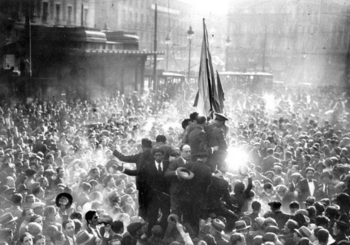October Revolution: Difference between revisions
No edit summary |
|||
| Line 53: | Line 53: | ||
==Background== | ==Background== | ||
==Course of events== | ==Course of events== | ||
==Outcome== | ==Outcome== | ||
==Aftermath== | |||
[[category:Nastanovo]] | |||
Latest revision as of 03:41, 30 November 2023
This article is incomplete because it is pending further input from participants, or it is a work-in-progress by one author. Please comment on this article's talk page to share your input, comments and questions. Note: To contribute to this article, you may need to seek help from the author(s) of this page. |
| October Revolution | |||||||
|---|---|---|---|---|---|---|---|
| Part of the Interwar Period | |||||||
 Nastnovian Worker's League orators inform workers of the toppling of the Sovereignty. | |||||||
| |||||||
| Belligerents | |||||||
|
|
| ||||||
| Commanders and leaders | |||||||
|
Emilo Vasquez Lorenzo Abasto Aarón Dengra | Dario Freire | ||||||
| Strength | |||||||
|
5,000 Striking Soldiers Several factories worth of striking workers 2 Naval Fleets(30 Vessels per fleet) |
Defenders of Sovereignty 5 Naval Vessels | ||||||
| Casualties and losses | |||||||
| Few wounded Red Militia soldiers | All imprisoned or deserted (One vessel with the Sovereign aboard escaped to international waters) | ||||||
The October Revolution, known in Nastnovian historiography as either the Great Social Revolution of October (by left-wing perspectives) or the Great Mistake (by right-wing perspectives), was a revolution in Nastanovo led by the Nastnovian Worker's League of Emilo Vasquez that was a key moment in the history of Nastanovo. It was the first revolutionary change of government in Nastanovo since the establishment of the Sovereignty of Nastanovo in 1779. It took place through an armed insurrection in Nostalta (shortly renamed to Revolucionaria) on 25 October 1926 and continued until its conclusion was declared in 1928 with the end of the Red Terror. It was the precipitating event of the Nastnovian Civil War which would occur four years later in 1930 and set Nastanovo on a collision course to its participation in the Second Great War.